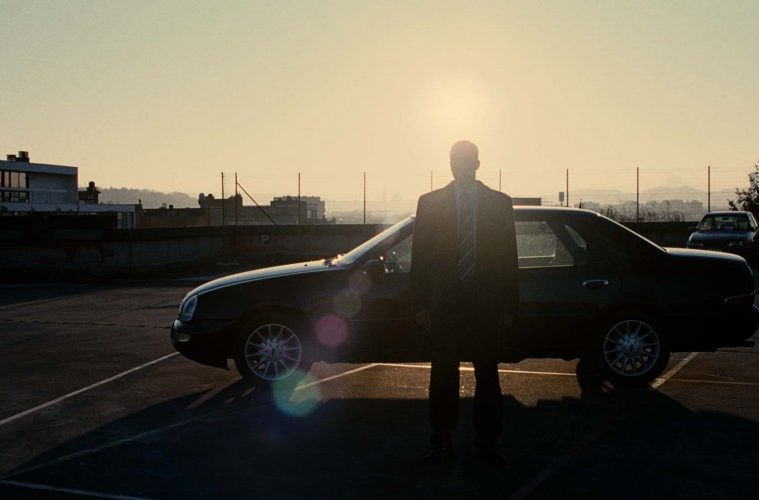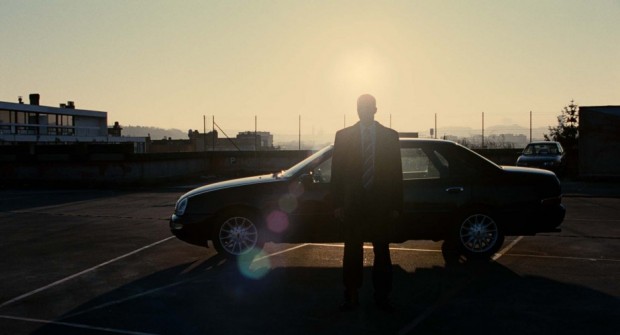Saturday began mainly with events and special screenings, but the one new film I experienced was The Day. Starring Dominic Monaghan as a leader of a small group of post-apocalypse survivors, this bleak tale breaks a lot of tropes and features strong female characters. One is a total bitch, though, which is a shame, while the other, Mary, (the star of The Last Exorcism, Ashley Bell) gives us a quiet and haunting performance. The film revolves around Monaghan and his group stumbling upon a desolate house that provides a brief respite from the elements for the weary travelers. Everything has a desaturated look to give the all too familiar dreary feel, and while they made strides for naturalism and getting away from the cliches, they managed to retain the cheesy and sometimes hamfisted dialogue so often associated with the genre.
Within the house they find their supposed salvation, but cannibals show up to ruin their fun, of course. While their meticulous caution with their lives and supplies is played up front and center in the first 30 minutes, when all hell breaks loose and they make their final stand (over the course of a day…), they sometimes become stupid again. There is also an incredibly frustrating moment when a character has a shot in the middle of the film but just shouts empty threats. Oh, and a pseudo-torture scene that goes nowhere yet wastes a good five minutes of my time. If you can’t tell, there are a lot of frustrating elements at play in The Day. They almost break more than they fix and it left me feeling saddened for what at its heart is a film that tries to provide something new.
After a few interviews Sunday morning, I went on to screen Smuggler, one of those batty films that truly exemplify the more crazed side of Fantastic Fest. They love featuring some odd films, and this definitely qualifies. From director Katsuhito Ishii, the film melds elements of typical over-the-top melodrama and hijinks so often associated with anime and manga. That it actually owes inspiration from a 2000 manga series of the same name is not a surprise, and the film nearly pulls off the feat with flawless and confident execution. The film boils down to everyday guy Kinuta and the new cleanup crew he works for being thrown into the middle of a drug war between Chinese and Japanese gangs.
Central are two superhuman assassins named Viscera and Verebrae who are as deadly as they are extravagant. One of the gangs goes after them following the brutal yet hilarious murder of their leader. To give an idea of the hilarious situations the film goes through, the introduction of said assassinated gang leader is a chain smoker that hates when others to smoke. When it is brought to his attention that some of his business associates might have smoked in his meeting room, he throws a tirade — with cigarette in hand — about the dangers of second-hand smoke and nearly has an aneurism in the process.
Smuggler also plays up the ultra violence in slow-mo fashion where they will slow down situations with character’s hilarious expressions just within the frame. However, one of the few hiccups in the film is a torture sequence that goes on for far too long despite being hilarious in the expression of the torturer named Mad Dog and his increasingly absurd outfits: at one point he wears a military jacket and a lace-looking diaper. There seem to be missing elements without explanation, and there is a lack of a singular narrative theme. Somehow, by the end, there is a hint of an arc but what that is still boggles my mind. Smuggler is nonsensical in most of what it does and capitalizes on familiar archetypes, but with the absurdist vision Ishii provides, hilarity and fun are at the forefront for 3/4ths of the film.
The biggest film of the day was actually the first secret screening of this year’s festival. Every year they seem to have a handful of secret screenings that largely remain completely unknown until minutes before showtime. These are one of the biggest draws and it’s almost always the hardest to get into. There is an inherent rush of anticipation for what might play, and sometimes they are North American premieres and sometimes they are just well-received films that haven’t pegged a theatrical release. The first secret screening was Pedro Almodóvar’s The Skin I Live In, one of the first times he has gone down the path of science fiction mixed with horror that retains his familiar traits while providing an enthralling narrative.
The film stars Antonio Banderas as a brilliant scientist who is experimenting on skin cells for burn victims along with face transplants. He isn’t above breaking new ground and he is leading his research with a patient named Vera. Beautiful and seemingly tailor made as the embodiment of female perfection, she is given grafts and bares a haunting resemblance to his dead wife. However, he also keeps her locked away and hidden; less showcase of what he has been able to achieve and more hidden pride. As the narrative unfolds we learn about her mysterious past and her happiness as well.
The film showcases a master at the top of his game, delivering a riveting and gorgeous narrative that manages to throw you off the trail numerous times before succumbing to the ultimate twist half way through. Yet, even with the full knowledge, I was so invested it didn’t even matter. Almodóvar plays with perceptions and strings you along and I was happy to sit back and watch.
The final screening of the night was Carre Blanc, and it may be the most difficult to describe and understand of all the films I have seen this year. The narrative is set in an unknown time and place with shades of Orwell’s 1984. Following Phillipe from a young age to adulthood, we are introduced to a world where the population is at the forefront of the mind with constant announcements of new births and the insistence that all of the citizens take up croquet. Yes, you are supposed to wonder what that has to do with anything and why they chose that sport. Phillipe evaluates potential employees with mind-game experiments that hopefully force people to think outside of the box but frequently causes death, anxiety, and depression instead. The death they can deal with though, as it is hinted that those that die are likely churned and made into meat. Phillipe also lives with his wife, Marie, who seems to be in a depressed mental state as she wanders the largely black, white, and dreary metropolis dominated by large buildings.
The plot is sparse and the dialogue even more so. Everything has a heavy, locked in feel. It doesn’t appear that people move up and down the job ladder very easily here, and even the interactions between people are odd situations without any real joy to be had. There is a constant blare from speakers all over the city that reminds people that having kids is a great joy, while also suggesting artificial insemination for those old enough (parental consent not necessary!). From first-time filmmaker Jean-Baptiste Leonetti, this spare dystopian tale is darkly humorous with the constant speaker interaction providing needed levity that will have limited appeal. Sitting at 74 minutes, it isn’t a long investment, but the lack of a clear storyline and sparse dialogue will keep many at bay. The visuals are uniquely done and there is an interesting notion of how modern working-class society has drained the life from us. Perhaps the greatest success is the mood and constant tension Leonetti creates.





